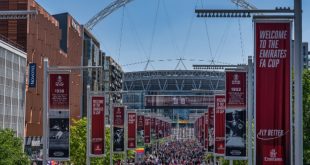 It is hard to miss bookmaker Tom Waterhouse on Australian television. No matter the channel or the sport, be it Wimbledon or the Melbourne Cup horse race, the bookmaker is never too far away to give the latest betting odds. But when he took an even more prominent role in March by sitting alongside the TV commentators for the National Rugby League, one of Australia’s most popular sports, it was a step too far for many fans and anti-gambling activists.
It is hard to miss bookmaker Tom Waterhouse on Australian television. No matter the channel or the sport, be it Wimbledon or the Melbourne Cup horse race, the bookmaker is never too far away to give the latest betting odds. But when he took an even more prominent role in March by sitting alongside the TV commentators for the National Rugby League, one of Australia’s most popular sports, it was a step too far for many fans and anti-gambling activists.
Broadcaster Channel 9 acted quickly to water down his role, but not before the bookmaker caught the attention of a Senate committee investigating the effects of pervasive betting advertising on children and problem gamblers. Due to report its findings on May 16, the committee may recommend that gambling advertising be banned completely from sports broadcasts during hours when children are likely to be watching.
“Young children who are watching a broadcast, many would find difficulty or be unable to distinguish between the sporting commentator and a gambling commentator,” said Andrew Wilkie, the independent senator leading the body’s inquiry. “I think the moves to distance Tom Waterhouse from sporting commentary is a positive step but in my opinion, it is not nearly far enough.”
Yet, despite the public indignation of Wilkie and several of his colleagues, odds are good that parliament will in the end take little action to curb the bookmakers.
For one thing, their money is too lucrative for the country’s sports leagues and broadcasters. Last year, online betting operators, excluding Tabcorp and Tatts, spent A$90 million ($93 million) last year on marketing, especially sponsorships, according to figures from the Australian Wagering Council given to the senate inquiry. As Waterhouse put it last month: “For TV to be able to afford broadcast rights, the funding of which is ploughed back into the sport, it needs to stay relevant to advertisers. In the modern age, traditional advertising no longer always works effectively.”
Waterhouse should know. A fourth-generation bookmaker and son of a prominent horse trainer, he was still taking bets track side four years ago before setting up his namesake website and becoming ubiquitous on sports programs and news bulletins as he poured millions into marketing.
The barrage of bookie marketing kicked off after a 2008 court ruling made it legal for the companies to operate nationally by easing restrictions on gambling and advertising across state borders, setting off a battle for market share. Sports betting is now the country’s fastest growing gambling segment, with 14.7 per cent annual growth over the last five years, according to analysts IBISWorld, and estimated annual revenue this year of A$400 million.
Australia’s bookmakers are not only competing with each other however. The ads also help to lure bets that would otherwise be placed with offshore operators unlicensed and untaxed in the country. The Wagering Council cites figures showing that the share of bets going offshore fell from 37.7 percent in 2003 to 13.8 percent in 2011 amid the ad blitz.
The industry emerged largely unscatched from a similar Senate inquiry two years ago which found that sports betting advertising was contributing to the development of gambling problems, particularly among young men.
The inquiry found that some problem gamblers were having trouble recovering because of the profusion of ads during broadcasts and that the promotions were “normalising” gambling with some “young children [shown to be] associating their love of sport with knowledge of betting odds”.
The inquiry recommended a ban on exotic bets and gambling advertising during sports broadcasts when children are likely to be watching, but neither was acted on.The new inquiry, despite considerable sound and fury, is likely to end the same way, according to Chris Downy, chief executive of the Wagering Council. “We are not expecting [anything] much different to come out,” he said.
Bill Brown of law firm Rockwell Bates agrees, noting that the inquiry is largely led by independents like Wilkie and senators from the Greens and other minor parties, with the country’s two major parties mostly standing aside with a general election set for September. Gambling is popular and there is no consensus on regulating the industry.
“There are no votes in gambling and therefore pre-election there will be zero interest in doing anything here that might negatively impact on the electorate,” Brown says.
Even Wilkie acknowledges reforms could be some ways off, saying that some of his colleagues are too scared of the industry. But the inquiry still puts pressure on the industry to reform, he argues. “Even if [the inquiry] comes up with recommendations that are not adopted by government … it helps to put the industry on notice that people are talking and thinking about reform.”
Indeed, free to air broadcasters last month introduced a proposed change to their code of practice to restrict promotion of live betting odds during sports telecasts, with pay TV and sports betting bodies expected to follow suit shortly. The plan by Free TV Australia, the broadcasters’ trade group, would forbid commentators and guests from promoting live betting odds during play and for 30 minutes before and after play. However live odds could still be included in advertisements and designated sponsored segments during commercial breaks, which some critics say would effectively mean no change from current practice.
______________________








